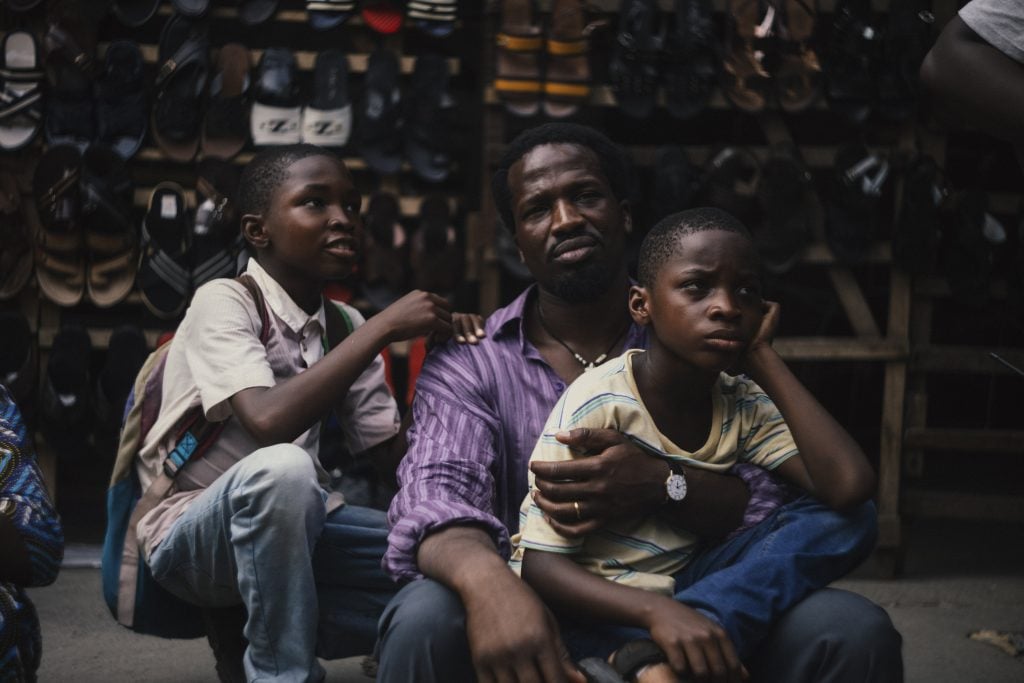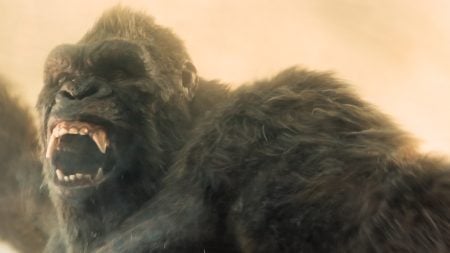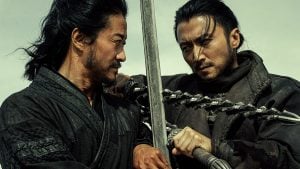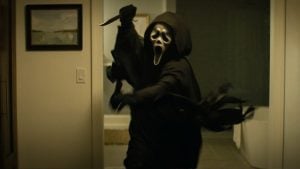Folarin (Ṣọpẹ́ Dìrísù) boasts an intimidating frame, but it captivates more than it frightens. He is of the sort that seems designed to invite eyes, not necessarily from those admiring his appearance but from those curious to explore something deeper than what meets the eye. That’s what holds Aki and Remi’s shared gaze, their eyes remaining glued to their father as he saunters around his bedroom, his lower half wrapped in a towel. As he questions them about their mother’s whereabouts – an answer they failed to prepare together, thus opting to reply that she just “went to the village” – and directs them to fetch him a glass of water, they focus on him as though he’s an animal in the wilderness, one who could bolt at any second. They remain still, sure to not make any sudden movements that might scare him off, only responding to his specific requests and addressing him when he does them. Is it a sign of fascination, or respect? Or, better yet, is it out of real fear, not exactly of him, but that he might scatter if they glance somewhere else for but a second?
The estrangement that leads to these concerns – as much as a complicated relationship between a working, occasionally-absent father and his two young sons can be dubbed an “estrangement” – lies at the center of Akinola Davies Jr.’s semi-autobiographical feature debut, My Father’s Shadow, a poignant work of reclamation. In some ways, it could even be seen as an exorcism. The boys (played by a pair of first-time actors/real-life brothers, Godwin and Chibuike Egbo) are inspired by Davies and his own sibling, Wale, with whom he co-wrote the film, and there’s a startling, unmistakable intimacy to the proceedings that often transcends what would typically warrant the “semi-autobiographical” label. Take, for instance, their film’s focus on a specific significant moment in Nigeria’s history: My Father’s Shadow takes place entirely on June 24, 1993, the day that Major General Ibrahim Badamasi Babangida annulled the results of the country’s first democratic election since its Second Republic was shut down via military coup 10 years prior. MKO Abiola, the nominee who received overwhelming support from voters, was considered a proponent for the people of Nigeria and their rights, and it’s no coincidence (in the narrative seen here) that Folarin is deeply affected by the results. For Nigerians, the annulment represented a stripping of rights, something already considered a deficient commodity in the nation; for Folarin, the resulting national crisis represents even more.
“Father, I will see you in dreams” is a common refrain that Aki and Remi recite in prayer, though when this particular dream begins to unfold on this Thursday in June – the first time they’ve seen their father in a long time – it looks a lot more like a nightmare, or at least a rough night’s sleep. Folarin works in Lagos and hasn’t been paid in six months, so he brings the boys along as he attempts to collect his money. This requires a two-hour bus ride from Ibadan, one that is halted by a petrol shortage that plagues the country and causes unrest amongst passengers. One shouts, “The problem with this country is discipline.” For others, Folarin included, the list of obstacles is longer. How is he meant to be a provider and a father when both demand more time than a single day affords any man? What lessons will he be able to leave behind for his children if he can’t be there to teach them? Perhaps above all, what impression is he leaving them with: That of a parent who is more an absentee, or a devotee?
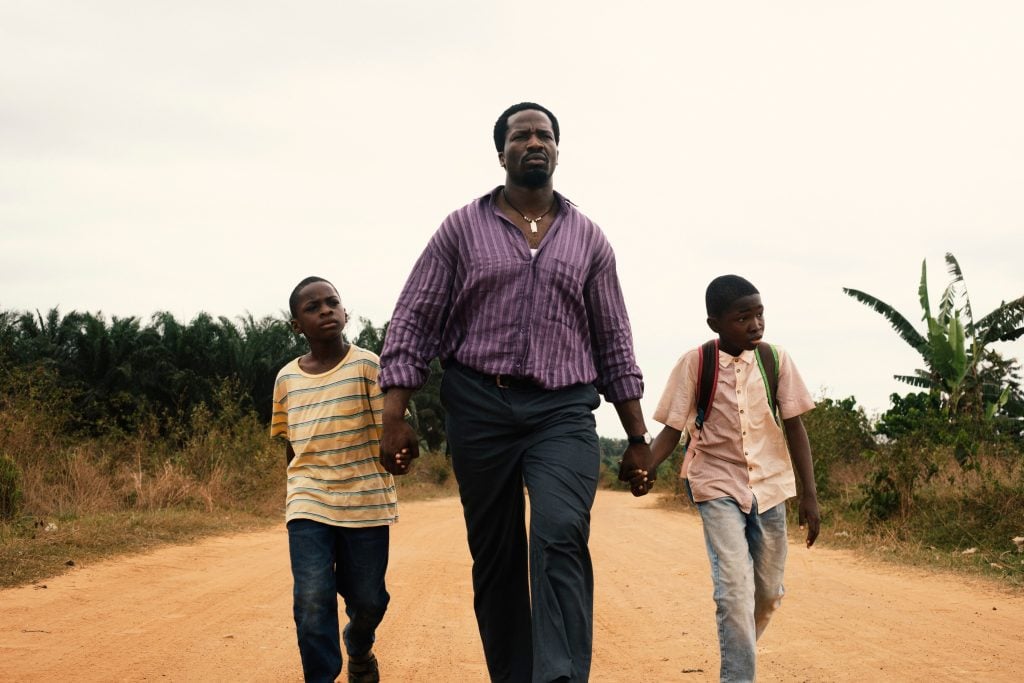
It’s in the frequent flashes of his dark past and the Davies’s script where these fears are shone in the most predominant light, though “darkness” might be a more fitting descriptor. We frequently see Folarin enduring nosebleeds, a stark omen. But there’s hope here, too, even in some of My Father’s Shadow’s most heartbreaking moments. While swimming together – in an immaculately filmed scene by cinematographer Jermaine Canute Edwards that is sure to remind viewers of Moonlight’s “middle of the world” sequence – Aki tells his father, “Mother is always working to take care of us, and because of that she is always sad,” to which Folarin replies that he is also always working for their sake, not their detriment. The difficulty here is that Aki and Remi still see their mother every day; when Folarin assures his son that his absence is out of love, Aki delivers what is perhaps the film’s most gutting observation: That his mother always tells him how much God loves him, regardless of the fact that he’s never actually seen God. “So, does that mean that the people that love us very much,” Aki asks, “we don’t see them often?”
While some of its most profound lines might sound too philosophical to ever feel rooted in reality, it’s pivotal to consider the fact that these boys, no older than 10, are growing and maturing amidst duress, with only one consistently present figure to hold their hands as they wade through the chaos. We never actually see Aki and Remi’s mother – her shadow doesn’t cast as prominently as their father’s – so it’s all the more fitting that the film’s final moments focus on an embrace between the brothers, their lone elder for the day sitting beside them and looking on without interference, as though he knows that, in all likelihood, they will have to be the ones to look after one another in the end. Dìrísù, at times tenacious while never failing to evoke kindness, takes a difficult task and elevates his performance out of the confines that a more formulaic film would have provided, in which his father figure is a disciplinarian without acknowledgement of where he’s come up short as a parent. Remarkable in 2020’s underseen His House and underutilized in this year’s The Gorge, the English actor juxtaposes his build – the kind that you could see inhabiting a stoic intelligencer, perhaps one named Bond – with his benevolence. He takes what could have been a showy part and turns it into something more subtle, with depth to spare while delivering just the right amount.
Yet it’s the Egbo brothers who rise from My Father’s Shadow as the true discoveries, as if there could be any other, a pair of young performers who share in their wonderment of the sudden reappearance of their father and their conflicted response to his arrival. It’s as if they’ve seen a ghost, albeit one they recognize. Not old enough to understand the position their home country is in but not green enough to misinterpret the fact that their dad is an inconsistent presence in their shared upbringing, they remain adherent to his supervisory demands and reasonably responsive to his sparing affection; it’s a difficult balancing act, one that they pull off wonderfully, and one that gives Davies’ film its ultimate power. It’s hard to build a bridge, even between family members, when the distance is too far for those on separate sides to make out whose shadow looms just out of reach, but the feeling that it’s there remains. The sensation of holding your loved one close is perhaps the only thing more powerful. If they can’t always have their dad, My Father’s Shadow argues, at least they will always have each other.
My Father’s Shadow held its North American Premiere as part of the Centrepiece section at the 2025 Toronto International Film Festival.
Director: Akinola Davies Jr.
Screenwriters: Wale Davies, Akinola Davies Jr.
Rated: NR
Runtime: 94m
The sensation of holding your loved one close is perhaps the only thing more powerful. If they can’t always have their dad, My Father’s Shadow argues, at least they will always have each other.
-
GVN Rating 7.5
-
User Ratings (0 Votes)
0
Will Bjarnar is a writer, critic, and video editor based in New York City. Originally from Upstate New York, and thus a member of the Greater Western New York Film Critics Association and a long-suffering Buffalo Bills fan, Will first became interested in movies when he discovered IMDb at a young age; with its help, he became a voracious list maker, poster lover, and trailer consumer. He has since turned that passion into a professional pursuit, writing for the film and entertainment sites Next Best Picture, InSession Film, Big Picture Big Sound, Film Inquiry, and, of course, Geek Vibes Nation. He spends the later months of each year editing an annual video countdown of the year’s 25 best films. You can find more of his musings on Letterboxd (willbjarnar) and on X (@bywillbjarnar).


